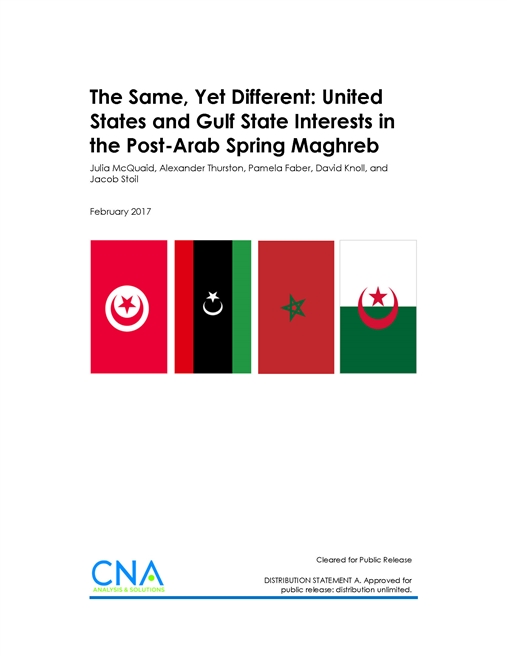The wave of unrest that swept across the Arab world in 2010-2011, often referred to as the “Arab Spring,” caused significant upheaval in Morocco, Algeria, Tunisia, and Libya—a region of North Africa collectively known as the Maghreb. This upheaval and its destabilizing effects elevated the Maghreb’s importance globally. The United States now has a greater focus on the Maghreb as it seeks to promote democracy and restore stability there. North Africa also has newfound prominence in the United States’ global counterterrorism efforts, in part due to the emergence of the Islamic State in Libya. Over the past year, the United States has expanded its military actions against the Islamic State to include North Africa, most notably in the form of airstrikes in Libya to support local forces in their efforts to liberate the Islamic State-held city of Sirte.
The United States, however, is not the only country that has taken an increased interest in the Maghreb. A number of European powers who have had long-standing relationships in the region—including France, Italy, and the United Kingdom—have become increasingly engaged in this part of the world. In addition, a number of the Gulf Arab states have also become more active in North Africa, pursuing their own political, economic, and security-related interests. The Gulf Arab countries have traditionally stayed focused on the Gulf region itself, or on its immediate borders, in places such as Syria, Lebanon, Yemen, Iraq, and Jordan. As a result, their increased interest and engagement in the Maghreb, which is outside their immediate neighborhood, is representative of shifts within the internal politics of the Arab world.
In order to understand the Gulf states’ evolving foreign policy interests and to effectively craft the United States’ own policies in the Maghreb, it behooves U.S. decision-makers and planners to understand what actions the Gulf Arab states are pursuing in North Africa, and why. As we will show, Gulf states’ policies have bolstered the Moroccan monarchy, irritated the Algerian regime, influenced Tunisian electoral politics, and exacerbated Libya’s civil war. Accounting for Gulf states’ actions can help the U.S. government identify mutual areas of interest, such as the stability of Morocco and Algeria, and manage areas of competition, such as the vision for Libya’s future.
In addition, the U.S. government and the Gulf Arab states have deep historical ties to each other and foreign policy interests that intersect not only within the Gulf region itself, but also in Syria, Lebanon, Yemen, Jordan, and Iraq. An understanding of what actions the Gulf states are pursuing in the Maghreb can establish a clearer image of what these states are trying to achieve as their foreign policy interests extend geographically over time. Such an understanding can also help synchronize U.S. policies, since the issue of Gulf states’ actions in the Maghreb crosses numerous bureaucratic lines, to include combatant command boundaries and State Department bureaus.
This occasional paper seeks to bring greater understanding to the issue of Gulf state interests in the Maghreb and the implications of those interests for U.S. goals in the region. It is the result of an initial exploration on this topic, comprising roughly three months’ of research. Therefore, it should be considered a foundational document upon which additional research can be done.
Download reportDISTRIBUTION STATEMENT A. Approved for public release: distribution unlimited.
Details
- Pages: 56
- Document Number: DOP-2016-U-014233-1Rev
- Publication Date: 2/24/2017
